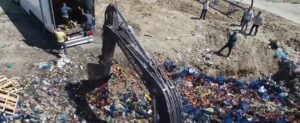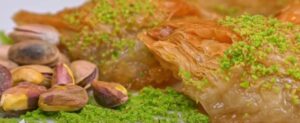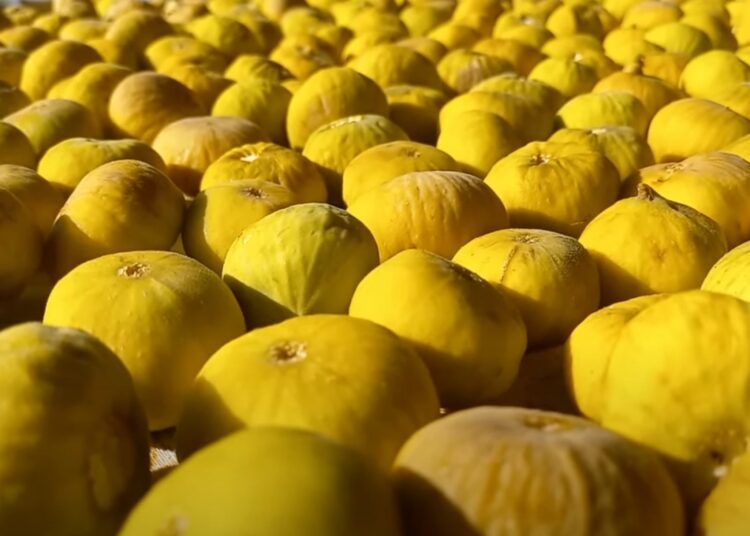Abdullah Bozkurt/Stockholm
Last year Turkish products accounted for the majority of alerts issued by the European Union’s Rapid Alert System for Food and Feed (RASFF), reflecting a concerning and systemic pattern of regulatory failures in Turkey. These shortcomings appear to be exacerbated by increasing corruption and the erosion of institutional integrity, driven by overt political interference, partisanship and favoritism.
The RASFF, a critical mechanism for safeguarding the safety and quality of imported food products, has issued 488 notifications concerning products originating from Turkey, according to an investigation conducted by Nordic Monitor based on RASFF data.
This represents a new record, surpassing the 408 notifications issued in 2023, a year in which Turkey also topped the list for the most alerts.
As a result Turkey maintained its position as the leading violator of food safety compliance regulations in the EU market. The lack of any significant improvement since the previous year, coupled with a worsening trend marked by an increasing number of violations involving Turkish products, highlights the failure of Turkish authorities to effectively address the issue.
The notifications primarily focused on issues such as pesticide residue, pathogenic microorganisms, contamination, mislabeling, unauthorized additives and mycotoxins. These findings underscore persistent challenges faced by EU countries in ensuring the safety of food products originating from Turkey. They also emphasize the urgent need for more robust monitoring systems for Turkish exports and increased pressure on the government of President Recep Tayyip Erdogan to compel Turkish authorities to enforce strict adherence to international standards.
The complete list of alerts in Excel format issued by the RASFF regarding Turkish exports to the EU in 2024:RASFF_window_results
The RASFF serves as a vital platform for facilitating swift communication among EU member states and associated countries regarding risks related to food and feed. Although Turkey is not a member of the EU, it remains a candidate country aspiring to full membership in the bloc.
As part of its customs union agreement with the EU and its status as a candidate in accession negotiations, Turkey is obligated to align its laws and regulations with the EU’s acquis, including the harmonization of its food safety standards with those of the EU.
Yet Turkey has failed to address the growing number of violations despite being a major food exporter to the European market and the EU serving as Turkey’s largest trading partner.
Experts attribute the growing corruption in Turkish institutions, undue political interference, narrow interests and blatant nepotism — favoring partisanship over merit in government positions — as the primary factors undermining regulatory bodies. The Erdogan government has faced widespread accusations of weaponizing regulatory agencies for political purposes, including targeting business entities owned and operated by its opponents and critics while protecting questionable businesses run by its supporters.
The troubling trends in the RASFF data for Turkey highlight the widespread erosion of Turkish institutions tasked with safeguarding public health and ensuring that food and feed do not pose any health hazards to consumers.

According to the data, almost all EU member states identified various risks to public health in food and feed products imported from Turkey, prompting them to issue alerts through the RASFF. Many Turkish products were rejected by border control authorities, preventing their entry into the domestic market, while others were found to have violated food safety regulations after reaching the consumer market.
Examples of rejected Turkish food products include dried figs and pistachios contaminated with aflatoxins and ochratoxin. Deltamethrin, pyraclostrobin, acetamiprid, sulfoxaflor and chlorpyrifos were detected in fresh pomegranates. Salmonella was found in ground hazelnuts, paprika powder, hulled sesame seeds, cumin and dog chews. Enterobacteriaceae was identified in cat food. Phosmet was found in fresh lemons, while high levels of cadmium and chlorpyrifos were detected in tomatoes. Acetamiprid was present in grapes, formetanate in fresh peppers, excessive sulfur dioxide in dried apricots and fosthiazate in cucumbers.
Other issues identified include the unauthorized use of titanium dioxide in chickpeas, aflatoxin in spice mixtures, plastic particles in salt grinders and aluminum and arsenic in ceramic dishes. Pesticides such as diflubenzuron were found in pears, chlorothalonil in green plums and flonicamid and etoxazole on peppers. Monochloro and propanediol were detected in olive oil, while high levels of nitrites were found in mineral water. Chlorpyrifos was found in chestnuts, chlormequat in cucumbers and excessive sulfur dioxide in dried apricots imported from Turkey.
The concerns highlighted by the RASFF have implications that extend beyond the European market. Alerts issued by the RASFF were also shared with the International Food Safety Authorities Network (INFOSAN), a global initiative established by the World Health Organization (WHO) and the Food and Agriculture Organization (FAO). INFOSAN facilitates the rapid exchange of information and collaboration among member countries to promote and ensure food safety worldwide.

Turkey has yet to take serious action to address the growing concerns surrounding its food and feed exports. The Turkish counterpart to the RASFF, operating as a directorate within a ministry, has been hindered by a lack of experienced personnel, an unclear mandate and limited operational capacity.
The examination of food and food-related products for public safety compliance in Turkey is conducted by the Turkish Food Safety and Control Directorate, which operates under the Ministry of Agriculture and Forestry. As the designated and official partner of the RASFF, the directorate is responsible for monitoring and regulating food safety standards. It also manages a dedicated webpage listing food products that have been altered in violation of established rules and regulations.
However, a review of the Turkish directorate’s website reveals a glaring omission: Products recalled from the European market or rejected by EU customs officials are often not listed. For instance, no alerts were issued in 2024 for dried figs or pistachios, despite multiple EU notifications concerning these products. Considering that exporters often sell the same products domestically, the directorate should have issued corresponding warnings. Similarly, there were no alerts regarding tomatoes, even though Turkish tomatoes were repeatedly rejected by both the EU and Russia due to pesticide residue.
In August Sweden notified the RASFF that a chickpea product exported by Turkish company Köy Leblebici contained the unauthorized use of titanium dioxide in its production, leading to a sales ban on the company’s products. Belgium also withdrew the product from its market. However, no similar recall was issued in Turkey, nor was any investigation launched into the company for the violation.
In January 2024 France notified the RASFF that an investigation had uncovered the presence of lead, phthalates and photoinitiators in pizza boxes imported from Turkey, prompting a market recall. However, no corresponding action was taken in Turkey regarding these products.
Turkey’s official response to alerts disseminated by the RASFF has been inconsistent. In some instances, Ankara provided responses to the alerts, but in many cases it simply ignored them, despite official communications from the European Union seeking clarification. The EU has repeatedly requested updates on actions or policy measures taken by the Turkish government to ensure the safety of flagged products, often with little to no substantive response.
The growing number of alerts issued by the RASFF has also attracted the attention of Turkey’s political opposition. On April 30, 2024 an opposition lawmaker submitted a parliamentary question to the government, addressing Minister of Agriculture and Forestry İbrahim Yumaklı. The inquiry sought clarification on the fate of products rejected by the EU and whether they were subsequently supplied to the domestic market. The lawmaker also asked how many producers had been investigated and whether fines were imposed on those responsible for products posing health risks to the public.

In June Yumaklı responded to the parliamentary question by asserting that items produced in Turkey undergo additional inspections prior to export, based on the importing country’s requirements or identified risks. “Only products that meet the destination country’s regulations are approved for export,” he stated. However, this explanation failed to address the high number of Turkish exports rejected by the EU for non-compliance with food and feed safety standards, leaving critical questions unanswered.
Yumaklı avoided addressing most of the specific questions posed. Instead, he said Turkey actively cooperates with the RASFF, follows up on alerts and destroys products rejected by the EU if they are found to violate Turkey’s food and feed safety regulations. He also claimed that Turkish authorities provide compliance training for producers and exporters and that products flagged by the RASFF are subjected to intensified official inspections to ensure stricter adherence to food safety standards. Additionally, he outlined the procedures for handling returned products but did not clarify the persistent gaps in enforcement or the reasons behind the EU’s high rejection rates.
Ibrahim Yumaklı, Turkey’s minister of agriculture, addressed the RASFF alerts in his letter to the Turkish Parliament:
During his year-end press briefing on December 26, 2024, Yumaklı reiterated the same talking points, stating that non-compliant products rejected by the EU were destroyed. He also emphasized that the ministry had increased pesticide inspections, claiming, “We have taken nearly 250,000 samples from pre-harvest production areas, post-harvest food businesses and the entire food chain before export. We destroy those deemed unacceptable during inspections.” Despite these assertions, the minister did not address the underlying issues of consistent non-compliance or the high number of Turkish products rejected by the EU.












